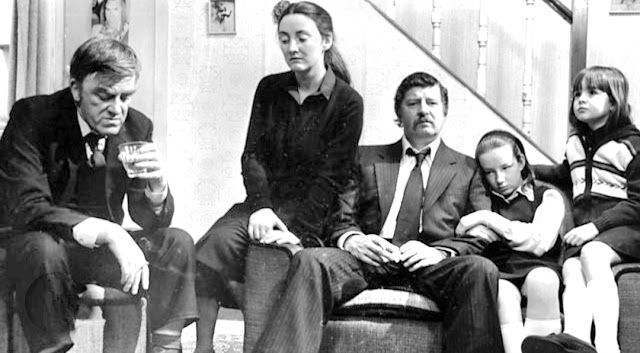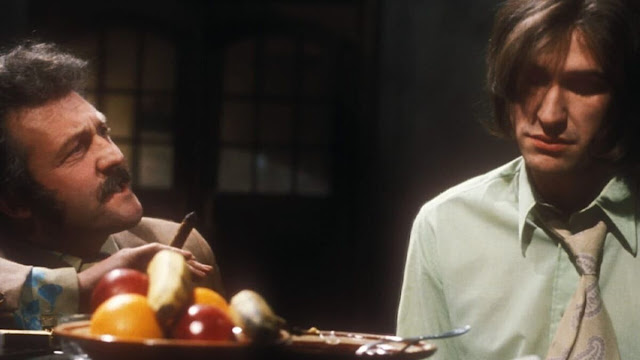Angels Are So Few by Dennis Potter, broadcast 5 November 1970
I enjoyed this odd little play. The opening scene is fairly unpromising. A Royal Mail van comes flying round the corner into a suburban street, a postman gets out to empty a pillar box, remarking on how cold it is, a woman watches him through her mullioned window and calls her child, saying it is "time for your programme", adding to herself, discontentedly, "time for MY programme." A young man comes rapidly down the street singing about Zion. He stops to chat to the postman who asks him why he isn't freezing, given that he is wearing sandals and bare feet, jeans, a cotton shirt and a striped blazer and nothing more. The newcomer replies, "It's winter my friend" and continues with a small sermon about how extraordinary it would be if all that we had ever said remained in the air above us, reminding us of the good and the bad utterances we have made. He explains to the postman that he is an angel and tries to get him to accept the present of a dead leaf The postman roars off and the young man looks after him, expressing great pity for him. Moments later the postman is dead. It is not difficult to draw the conclusion that the young man somehow knew that this was about to happen.
We then return to the interior of the house and the woman we saw looking out the window earlier. I should admit that I took against this character instantly when it became clear that she does not recognise that her child is adorable. This little boy watches an extremely odd children's broadcast in which a woman reads a story mostly consisting of the phrase "Grill me some bones". His mother joins him briefly but then the young man with the sandals interrupts by ringing the doorbell and asking the woman if she believes in god. Reluctantly she lets him into the house. He sits down in her kitchen and accepts a mug of tea.
We then cut to the outdoors again, where we see the young man standing behind a birch tree looking on as the neighbourhood gathers around the dead postman. There is a high pitched whistling noise, which continues for a couple of seconds after we have cut back to the interior of the young woman's house where the young man is talking about how the mind and the brain and body are separate things and the mind can jump about on its own. He moves on to the subject of freedom and then attempts to give the woman a dead leaf as a present, (whether the same one he offered the postman, I don't know). He explains its beauty and significance. The young woman chucks him out. Just as he said to the postman, so he says to the woman, "I feel extremely sorry for you". Once again, we hear the same high pitched whistling and briefly we have a glimpse of the young woman, dead.
The possibly angelic young man goes out into the street and appears to vanish into the air, although of course this may only be a trick of the film editor, designed as a ruse.
The next scene shows the woman the angelic man visited, sitting with her husband, watching a live recording of a pornographic film on the BBC. The husband wants to switch it off, but his wife doesn't. One of the performers is interviewed as they watch and puts forward what the husband, outraged, describes as:
"A straightforward incitement to a version of immorality." He turns the television off, saying "The BBC seems to have lost all sense of responsibility and decorum," which interested me very much as I've been wondering for a long time when exactly it happened.
The wife is extremely annoyed that her husband has turned the set off without first getting her permission. A row ensues, in which she details the housework she doesn't like and says:
"If the milkman didn’t have dirty teeth and a wart on the side of his nose, I’d let him screw me rigid", which I think is an illustration of where feminism started to go wrong. No matter how much sexual promiscuity women might throw themselves into, it will never have any effect on how much housework needs to be done.
Anyway, the husband stumps off ,after being told, "You’d rather murder your own grandmother than be vulgar", and the woman lights a cigarette and turns the television back on. Things have shifted considerably on the screen. We now sitting an elderly man sitting beside a large cross, asking, "Who is god and where is god?" He introduces the subject of angels and then recites Donne's poem, "Twice or thrice have I loved thee." "There is still a magic in life which we only dimly sense", the man adds, continuing that angels are "messengers of god's love - and sent to warn of death." The woman switches off the television, remembering that her visitor told her he would be back. She apologises to her husband and tells him she feels suffocated. Unfortunately he calls her "old girl", and she recoils, enraged.
We now cut to another household. The angelic young man is visiting an elderly couple. It may be the following day, as it now appears to be afternoon and time for tea. Sadly, during the course of the visit one of the couple dies - after the angelic young man has said how sorry he feels for him . Before this happens, the female of the couple recalls an image of an angel that she loved as a child and reveals it was a female. This maddens the angelic young man, which could lead viewers to think that he is merely a sexually repressed person who wanders about wrongly dressed for winter. But what of the whistling and the vanishing upwards and the being behind a birch tree and simultaneously in a kitchen? Who knows.
To cut a long story short, the young man does in the end return to the household of the bored housewife and they go to bed together. He then either loses his angelic nature or never had it. I don't know which, but he does have a temporary crisis. The play ends with the housewife muttering "Poor angel" to herself, staring into her dressing table mirror. It seems far from impossible that she will, as foreseen earlier, take an overdose and be found lying dead on her bed. The credits roll as the angelic young man walks away, to begin with looking disconsolate but rapidly regaining the spring in his step, as "You May Not Be an Angel" is sung in the background, possibly by Nat King Cole.
I have no idea what Dennis Potter meant by any of this, but it was diverting, particularly because the central performance was so good. The central female character did not quite work for me and I suspect this is because she was written by a man who somehow didn't really understand women.
"How we despise the ordinary everyday things that are really beautiful, and we cherish the worthless things that we can buy for money", the angelic young man says at one stage. He surely has a point.



Comments
Post a Comment